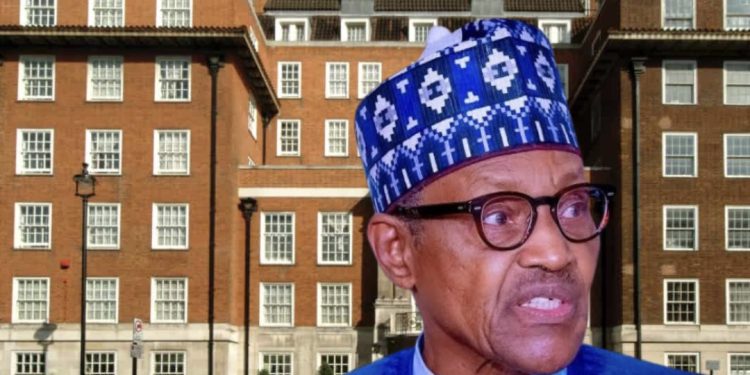The death of Nigeria’s former President, Muhammadu Buhari, in an upscale London hospital underscores the urgent need for world-class health facilities in Nigeria. It is particularly concerning that a former head of state, Abdulsalami Abubakar, was admitted to the same London hospital while Buhari was there.
Some of President Bola Tinubu’s overseas trips have been linked to medicals, which he denies. This casts Nigeria as a country without adequate medical capacity.
Over the years, successive Nigerian leaders have promised to rectify the decay in the health sector, but they have all failed woefully to deliver any meaningful improvements.
Back in April 2016, Buhari himself pledged to end sponsored medical trips abroad for government officials.
Buhari said, “While this administration will not deny anyone of his or her fundamental human rights, we will certainly not encourage expending Nigerian hard-earned resources on any government official seeking medical care abroad, when such can be handled in Nigeria.” It was all empty talk.
Buhari quickly broke this vow, travelling to the UK in June 2016 for an ear infection, and spending a total of 225 days outside Nigeria for medical reasons by December 2022.
One such trip coincided with a strike by the National Association of Resident Doctors over unpaid allowances. The late president undertook 84 journeys to 40 countries during his tenure.
This trend is not new. Former President Umaru Yar’Adua spent considerable time abroad on medical treatment before his death in a Saudi hospital in May 2010.
The wife of former President Olusegun Obasanjo, Stella, died in October 2006 in a Spanish hospital. Ex-Ondo State Governor, Rotimi Akeredolu, passed on in Germany in December 2023.
Such “medical tourism” drains the national treasury and perpetuates underinvestment in local health systems, with scarce foreign exchange spent abroad while facilities and workers at home cry for support.
The persistent strikes in the health sector have not significantly swayed the country’s leaders to provide world-class hospitals.
Nigerians spent an estimated $29.29 billion on foreign healthcare, averaging $3.6 billion annually in the eight years to May 2015 under Buhari, according to CBN data. This is a staggering sum.
The rot at home is distressing. Nigeria’s doctor-to-patient ratio is a dismal 1:10,000, far from the WHO’s recommended 1:600. Many rural communities lack access to health facilities.
The UN says one in 100 women dies in childbirth or in the days after in Nigeria. In 2023, Nigeria accounted for 29 per cent of global maternal mortality.
Misdiagnosis and avoidable deaths at various hospitals are rife in Nigeria due to factors ranging from inadequate equipment to a shortage of experienced doctors, nurses and other healthcare practitioners.
The billions of dollars spent on foreign hospitals could fully equip local health facilities and expand the National Health Insurance Scheme.
Yet, it is not about money, but the political will. Cuba, with a GDP of $107 billion, less than half of Nigeria’s, is adjudged to have one of the best health sectors globally.
It achieved a significant milestone in 2015 by becoming the first country to receive the WHO’s validation for eliminating mother-to-child transmission of HIV and syphilis.
By contrast, Nigeria faces a high prevalence of infectious diseases, maternal and child mortality, and malnutrition, further straining its healthcare system. Inadequate data collection also contributes to the weak health system.
Nigeria’s hospitals encounter numerous challenges that hinder their ability to provide quality healthcare.
They lack basic diagnostic equipment and stocked pharmacies, while many facilities are dilapidated, with water shortages, power outages, and unsanitary conditions that increase the risk of infections.
Healthcare workers face security risks, including kidnapping, harassment, and assault, making retention difficult in remote areas. Promotions are slow, and funding for research or international exposure is rare.
Health workers are underpaid, with junior doctors earning about n200,000 monthly. This results in low morale, burnout, and a desire to seek better-paying opportunities abroad.
The COVID-19 pandemic trapped many of the elite class in-country and denied them access to foreign treatment, resulting in deaths, yet nothing was learnt from that experience.
The health sector remains chronically underfunded, with the 2025 health budget being only 5.18 per cent of the total national budget, far below the 15 per cent target set by the Abuja Declaration.
Hospitals struggle to cope with patient demand, resulting in long wait times, overworked staff, and a decline in healthcare quality.
At least 16,000 doctors have migrated abroad between 2019 and 2024, exacerbating the staffing shortage and compromising healthcare delivery.
The public has lost confidence in the healthcare system, with many seeking medical care abroad or at local, ill-equipped places or even indulging in self-medication.
A 2021 study found that 51 per cent of Nigerians resorted to self-medication.
Addressing these challenges will require significant investment in healthcare infrastructure, personnel, and policy reforms to improve the overall quality of care for the populace.
However, there is a ray of hope. Tinubu recently opened the African Medical Centre of Excellence, marking a historic milestone in Africa’s journey towards healthcare sovereignty.
The $300 million tertiary medical facility, developed by the African Export-Import Bank in partnership with King’s College Hospital London in Abuja, is designed to meet the highest global standards.
More than a hospital, the facility represents a bold statement of Africa’s determination to reduce dependence on foreign health systems and reverse the estimated $6-10 billion Africans spend annually seeking treatment abroad.
It is a sad commentary to note the deterioration of the leading hospitals in Nigeria. These hospitals, which ought to be centres of excellence, have been starved of funding. Even the tertiary health institutions are unable to meet expectations. Their services are generally expensive, with patients having to pay for even the most basic supplies. Shortage of bed space means many patients are accommodated in corridors or turned away.
Therefore, Nigeria needs world-class hospitals to attain improved healthcare and meet global standards. World-class hospitals will raise the standard of healthcare and guarantee better living for Nigerians.
The billions of dollars expended on medical tourism can be redirected into providing excellent facilities, reducing the burden on Nigerians. World-class hospitals will guarantee increased access to specialised care through targeted medical services, addressing specific health needs and improving overall healthcare delivery.
This will promote enhanced research and innovation, training and contribute to the development of the healthcare sector. By investing in quality healthcare, the country will attract medical tourists, create jobs and stimulate economic growth.
Telemedicine and other digital health solutions can help extend healthcare services to remote areas. The Nigerian elite must realise that the parlous state of the sector is a major cause of the country’s economic woes.
The political class and the elite must make conscious efforts to stem the tide. Those in government should use local facilities to better appreciate and address their challenges. State governors and local government chairmen should join in the initiatives. Only with this commitment can Nigeria create sustainable, world-class healthcare for all.















































